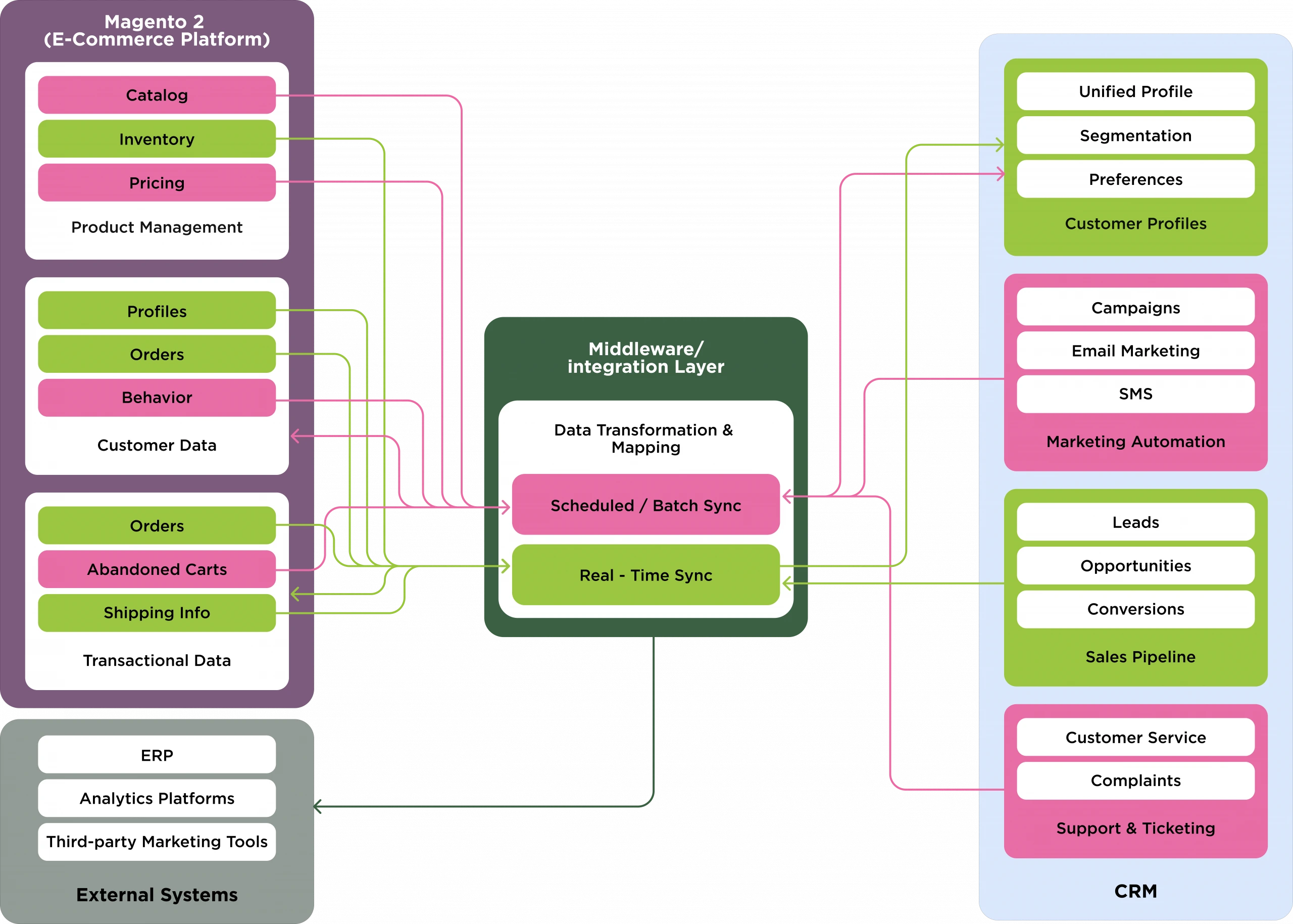Remember the times you used to lay down on the couch to do online window shopping and got recommendations so perfect that you ended up making a purchase? Well, it happens to the best of us. And it’s neither a coincidence nor magic! It’s the power of a smart CRM working behind the curtain.
A CRM (Customer Relationship Management) system does exactly what it says. It empowers businesses to seamlessly manage all kinds of customer data, understand customers, and enhance targeted marketing campaigns. An indispensable requirement for ecommerce brands, CRM, when integrated with Magento, is a match made in ecommerce heaven as it transforms how you receive and analyze customer insights.
From Salesforce to Zoho, Microsoft Dynamics, and HubSpot, some of the most popular CRMs are compatible with Magento, offering unique features that promote data-driven decision-making that streamline operations and enhance shopping experiences.
Why Are Magento CRM Integrations Important?
When you integrate a CRM with your Magento store, it instantly connects the dots between marketing, sales, and customer service teams, making collaboration effortless.
Centralized Customer Data:
Get all critical data, such as orders, customer interactions, and preferences in one centralized place.
Improved Marketing Efficiency:
Create more targeted campaigns, improve audience segmentation, and effectively track campaign performance with the data from CRM.
Enhanced Customer Support:
Let your support team resolve issues faster and more accurately with detailed customer histories from CRM.
Increased Retention:
Create innovative strategies and loyalty programs to skyrocket your customer retention by analyzing customer behavioral data.
How to Choose the Right CRM for Your Magento Store
Choosing the right CRM becomes vital to meet your specific goals. Here are a few factors to consider.
Scalability:
The CRM you choose should be able to support the growth of your brand.
Advanced Features:
Based on today’s competitive business landscape, your CRM should have modern features like audience segmentation, automation, smart reporting, etc. that can help your marketing.
Customizability:
Ensure that the CRM has customization options that allow you to acquire accurate data, improving operations and sales further.
Budget:
Choose a CRM that fits your budget while offering an ROI. While features and functionalities are always the first things to consider in a CRM, you should also make sure that it fits your budget and offers a sustainable ROI.
Ease of Integration:
CRMs that offer native Magento extensions or the ones with strong API support can simplify the integration.
Let’s take a look at the most prominent CRM solutions for Magento.
Salesforce:
One of the most popular CRM in the market, Salesforce CRM is built to support enterprise-level businesses with its high-end features and scalability.
HubSpot:
Small and medium-level businesses can choose HubSpot as it’s packed with user-friendly tools for lead tracking and marketing automation.
Zoho CRM:
Being a highly customizable CRM that comes at an affordable cost, Zoho CRM is the choice for many startups and mid-sized businesses.
Microsoft Dynamics 365:
For those looking for a CRM that can be easily integrated with Microsoft products, Microsoft Dynamics 365 is an ideal choice.
Methods of Magento CRM Integration
Native Integration
Some CRMs, such as HubSpot and Salesforce, have the Magento extensions listed on the Magento marketplace, which make the entire integration process simpler and seamless while also providing advanced features like smart analytics dashboards and real-time data syncing.
Third-Party Integration
CRMs lacking native support for Magento can be integrated with the help of platforms like Magenest and Zapier. These cost-effective third-party integrations can reduce the need for complex custom integrations.
Custom API Integration
Magento’s REST or GraphQL APIs are great options for those businesses looking for custom integrations for their unique requirements. While this approach comes with way more flexibility than the other two, it also demands more technical expertise.
How to Set Up CRM Integration with Magento
There are three different ways you can integrate CRM with Magento.
1. Using Magento Extensions:
- Visit the Magento Marketplace.
- Search for CRM extensions (Zoho or Salesforce).
- Install the extension and finish the configuration to sync data between the CRM and Magento.
2. API Integration Setup:
- Create endpoints with Magento’s GraphQL or REST APIs.
- Enable secure authentication using OAuth 2.0.
- Modify workflows for seamless data syncing, from customer profile syncing to order updates.
3. Third-Party Service Integration:
Use platforms like Automate.io or Zapier to map data fields and set automation rules for seamless Magento CRM integration.
Typical CRM Integration High Level Diagram

Advanced Magento CRM Integrations for B2B Solutions
Customer Account Hierarchies and Roles
Mirror team roles and permissions by synchronizing B2B-specific CRM features like account hierarchies.
Quotation and Price List Management
Streamline B2B negotiations by enabling customer-specific price lists and efficient quotation approval processes.
Order and Contract Management
From managing contract renewals to recurring orders and shopper-specific order histories, CRM integration fosters long-term relationships.
Key Data Points to Sync Between Magento and CRM
Customer Information:
Customer name, contact details, purchase history, etc.
Order and Transaction Data:
Order details (date, product, quantity, etc.), order synchronization, payment status, shipping details, etc.
Customer Support Data:
Support tickets to make sure issues are resolved quicker.
Product Catalog:
Product information (names, descriptions, availability, etc.) to ensure more accurate personalized product suggestions and improved marketing campaigns.
Marketing Data:
Email marketing list, audience segmentations, campaign performance information, and more.
How to Optimize and Maintain Your Magento CRM Integration
Data Validation and Cleanup
Conduct regular checks to make sure that the transaction records, order histories, and customer profiles are error-free. This will prevent any mishaps or duplicate data, leading to smooth customer experiences and error-free decision-making.
Monitor Integration Performance
Employ monitoring tools to track and fix any data transfer errors, sync lags, or other integration issues to keep the workflow smooth and operations unaffected.
Periodic Updates and Testing
Keep testing and updating the integration modules with every CRM or Magento update to make sure that the integration stays functional. It also enhances security with the latest patches.
Overcoming Common Challenges in Magento CRM Integration
Data Syncing Issues:
Data syncing delays can ruin operations, marketing, and customer experience. From outdated modules to server overload, you should identify the root causes of the issues while also ensuring that the scheduled and real-time syncing are configured. Several reliable APIs and extensions are available to help with this issue.
API Limitations:
With their usage limitations, APIs can disrupt data syncing without proper management. To combat this issue, businesses can draft effective workflows where the most critical data is synced in real time while the less important data is scheduled to sync during less busy hours. This will ensure that the API is not overwhelmed and functions accurately.
Handling Duplicate Records:
To deal with duplicate entries and records, businesses should conduct periodical database scanning and cleaning. While it can be done directly from the CRM, there are plenty of external deduplication tools available that can merge duplicate data and offer reliable and accurate customer information.
Benefits of Integrating Magento with a CRM

Enhanced Customer Data Centralization:
With the right CRM, all customer data like customer interactions and preferences can be viewed under one roof, creating a unified experience.
Improved Sales and Marketing Alignment:
CRMs can lead to more effective marketing strategies and optimized campaigns as the data gathered from them offers a detailed insight into customer requirements.
Automated Customer Support and Follow-Ups:
You can automate the repetitive tasks and workflows, such as follow-up emails and reminders for faster action and better customer support.To further enhance customer satisfaction, consider using a Customer Feedback Platform to actively solicit and analyze customer feedback. This can help you identify areas for improvement and automate targeted follow-up actions based on specific customer needs.
Insights and Analytics for Better Decision-Making:
Smart CRM analytics can equip businesses to make more data-backed decisions, driving better customer relationships and business growth.
Future Trends in Magento CRM Integration
Enhanced Personalization with Real-Time Data
Thanks to the real-time data synchronization capabilities, browsing behavior, customer preference, purchase history, and other customer information can flow effortlessly between Magento and the CRM. This ensures highly personalized shopping experiences, from customized discounts to smart product recommendations and activity-driven emails.
AI-Driven Customer Insights
With advanced AI technologies that generate smart customer insights, businesses can decode customer data to identify patterns and segment the audience, leading to smart predictive analysis for iron-clad marketing strategies. For example, companies can leverage AI to identify high-value customers (with more potential for repeat purchases) and engage them with targeted marketing campaigns.
Voice Commerce and Chatbots
You can connect AI chatbots and voice assistants with your CRM to enable real-time access to product catalogs, order histories, and customer profiles. This integration enables the chatbots and assistants to provide highly contextual responses, such as resolving queries and smart product recommendations, creating faster and more efficient customer interactions.
Wrap-Up
Integrating CRM with your Magento store is much more than a technical upgrade. It’s a strategic move that impacts your marketing, operations, and workflow all at once. From streamlined operations to smart customer insights, better campaign management, and improved customer interactions, with the right CRM, you’re one step closer to conquering the industry.










